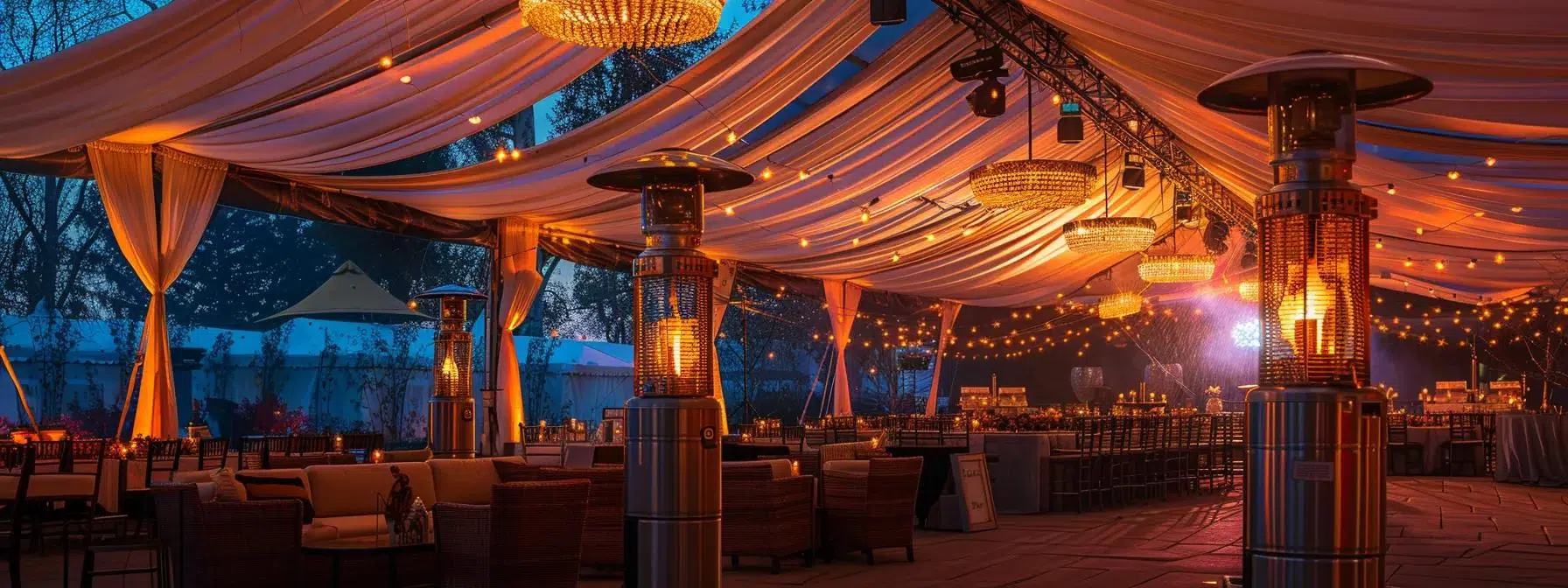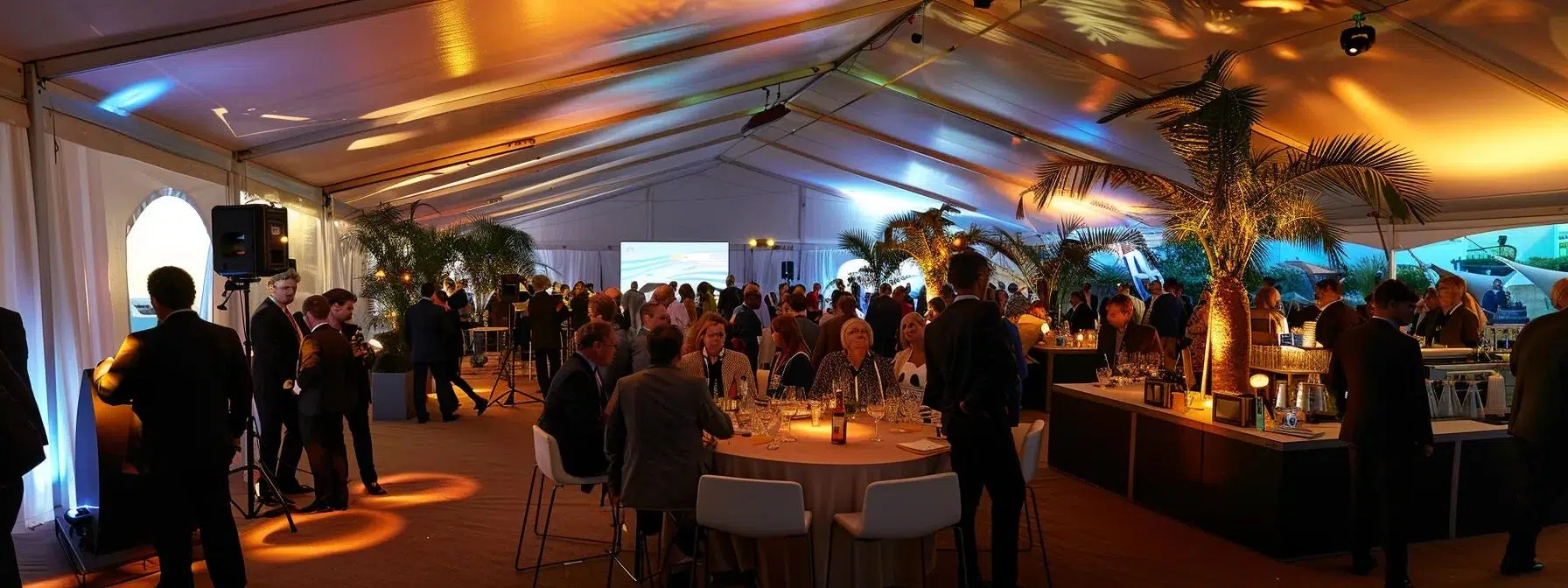The success of any outdoor event depends on attendee comfort, making optimal climate control in tented venues crucial. Event planners must overcome extreme weather by using effective heating, cooling, and ventilation solutions that ensure guest safety, comfort, and energy efficiency. This article outlines various systems, sizing methods, safety measures, and cost considerations to help planners achieve premium climate control.
Key Takeaways
- Effective heating and cooling systems are essential for a comfortable tent environment.
- Proper sizing, energy efficiency, and necessary safety precautions are key.
- Different event types need tailored climate control solutions.
- Case studies and cost breakdowns offer valuable insights.
What Are the Best Heating Solutions for Tent Events?

Tented events in cold weather require robust and safe heating solutions designed for temporary structures. Systems vary according to tent size, insulation, and event duration, and help enhance guest satisfaction while protecting the tent from moisture and condensation.
Which Types of Tent Heaters Are Most Effective?
Effective heaters include propane, radiant, and forced-air systems. Propane heaters offer portability and high output but need ventilation. Radiant heaters warm people and objects directly, ideal for smaller events. Forced-air systems distribute heat evenly, suitable for larger venues. The choice depends on outdoor temperatures, tent materials, and safety standards.
How Do You Size a Heating System for Your Tent?
Sizing depends on the tent’s square footage, insulation, and occupancy. A common method is to calculate the total BTU (British Thermal Unit) per square foot. For example, a 20×40-foot tent in mildly cold conditions might need 30,000 to 50,000 BTUs per hour, with higher outputs for larger or poorly insulated tents. Accurate sizing prevents overheating and reduces fuel consumption.
What Safety Measures Should You Take When Using Tent Heaters?
Safety is vital when using heaters. Always ensure adequate ventilation, install carbon monoxide detectors, and follow manufacturer guidelines. Heaters should be securely anchored and inspected regularly to prevent leaks or tip-overs. Keeping a fire extinguisher nearby further minimizes risks during events.
How Can You Cool a Tent During Hot Weather?
Cooling a tent in hot weather is as important as heating during cold spells. Excessive heat leads to discomfort and health issues like dehydration. Effective cooling maintains a refreshing and energizing atmosphere by lowering temperatures and improving air circulation.
What Are the Different Types of Tent Cooling Systems?
Cooling systems include air conditioning units, evaporative coolers, and integrated fan systems. Air conditioners are effective for larger tents, while evaporative coolers (swamp coolers) lower temperatures through water evaporation and work well in dry climates. High-powered air movers further disperse heat, and the best option depends on humidity levels and the tent’s layout.
How Do You Determine the Right Cooling System Size for Your Tent?
System size is based on tent volume, local climate, and guest density. Cooling capacity is measured in BTUs for air conditioners or CFM (cubic feet per minute) for fans and air movers. Large tents with high ceilings need higher CFM ratings, while extreme heat may demand more powerful air conditioners. A proper assessment prevents underpowered systems and reduces energy waste.
What Ventilation Strategies Improve Tent Cooling and Airflow?
Combining mechanical and natural ventilation improves airflow. Position intake vents on the windward side and exhaust vents on the leeward side to promote cross-ventilation. Portable fans, roof vents, and side panel adjustments aid in releasing warm air and preventing stagnant, humid pockets inside the tent.
Why Is Ventilation and Air Quality Important in Tented Venues?

Proper ventilation is crucial for maintaining a healthy environment by ensuring good air quality. It prevents condensation, reduces the risk of respiratory issues, and minimizes buildup of pollutants or carbon monoxide. Consistent air exchange improves guest comfort and safety, especially when heating systems are in operation.
What Ventilation Systems Are Available for Tented Events?
Ventilation options include exhaust fans, roof vents, and side openings that allow natural airflow. Advanced systems combine mechanical ventilation with automated controls that adjust settings based on temperature and humidity, ensuring a consistent exchange of fresh air.
How Does Proper Ventilation Enhance Comfort and Safety?
Good ventilation prevents heat and humidity buildup, reducing headaches and dehydration. It also minimizes the concentration of harmful substances inside the tent and supports energy-efficient operation, which is particularly important when heating systems are used.
How Can You Control Humidity and Dehumidification in Tents?
Managing humidity involves supplementing ventilation with dehumidifiers. Portable dehumidifiers help remove excess moisture during rainy weather or in humid climates, while hygrometers allow planners to monitor and adjust humidity levels to prevent mold or static electricity issues.
How Do Climate Control Needs Vary by Event Type?
Event-specific climate control solutions are required depending on the event’s nature, scale, and purpose. A wedding tent may demand an elegant, quiet system for mild heating and cooling, while corporate events require robust systems that adjust to changing occupancy. Understanding these differences leads to better system selection and guest satisfaction.
What Are the Climate Control Requirements for Wedding Tents?
Wedding tents favor gentle, unobtrusive heating in cool evenings and subtle cooling during warm days. Systems that operate quietly and deliver adjustable temperatures help maintain a romantic atmosphere while ensuring excellent air quality.
How Is Climate Control Managed for Corporate Events?
Corporate events need powerful yet flexible systems with central control for consistent temperature regulation across large, diverse spaces. Features like real-time monitoring and remote adjustments are essential for balancing comfort with professional efficiency and minimal noise output.
What Special Considerations Are There for Festival Tent Climate Control?
Festivals present unique challenges due to large audiences and variable weather. Their systems must be scalable, weather-resistant, and capable of rapid assembly and disassembly. High airflow, multiple power sources, and mobile climate units, along with efficient dehumidification, are preferred to handle the dynamic outdoor environment.
What Are the Most Energy-Efficient and Eco-Friendly Climate Control Options?
Eco-friendly climate control solutions reduce operational costs and environmental impact. Energy-efficient systems lower carbon footprints while maintaining guest comfort. Innovations in renewable energy and sensor-based technology enable sustainable operation without sacrificing performance.
Which Climate Control Systems Offer Energy Savings for Tented Venues?
Systems such as high-efficiency heat pumps, inverter-driven air conditioners, and solar-powered units save energy by transferring heat or adjusting power consumption based on demand. These are often paired with smart thermostats for automatic control based on occupancy and ambient conditions.
How Can You Implement Eco-Friendly Climate Control Solutions?
Planners should assess each venue’s energy sources and consider portable, energy-efficient systems. Partnering with certified suppliers and using LED lighting and low-energy fans can further reduce consumption. Regular maintenance and sensor-based monitoring help sustain energy efficiency throughout the event.
How Much Does Climate Control for Tented Events Cost?
Costs vary widely based on system type, tent size, event duration, and local weather conditions. While high-quality, energy-efficient systems may have higher upfront costs, they yield long-term savings through improved performance and reduced utility bills.
What Factors Influence the Cost of Tent Heating and Cooling?
Key factors include tent dimensions, system efficiency, installation complexity, and local energy rates. Larger tents and complex installations increase costs. Seasonal demand and regional energy price variations also affect overall expenses.
How Can You Get a Customized Climate Control Quote?
Event planners should work directly with specialized providers who perform on-site evaluations of tent dimensions and guest densities. Detailed consultations cover installation logistics, expected energy consumption, and rental durations to provide tailored, cost-effective solutions.
What Are Successful Examples of Climate Control in Tented Venues?

Effective climate control is proven by numerous events, including high-profile weddings, corporate conferences, and music festivals. Successful implementations feature carefully selected systems, professional installation, and ongoing support that result in high guest satisfaction and reduced weather-related disruptions.
Which Case Studies Showcase Effective Heating and Cooling Solutions?
One case study highlights a wedding where radiant heaters and centralized air conditioning provided comfort during a sudden cold snap. Another example shows a corporate conference in a large tent where custom ducted systems maintained a steady temperature throughout a multi-day event. A music festival successfully used modular evaporative coolers and portable dehumidifiers for optimal performance.
What Do Clients Say About Their Climate Control Experience?
Clients report improved comfort, higher attendance, and fewer weather setbacks when reliable climate control solutions are in place. Positive guest feedback often leads to repeat bookings and reinforces the importance of investing in quality systems.
| Event Type | Heating/Cooling System | Benefit | Estimated Cost Range |
|---|---|---|---|
| Wedding | Radiant heaters, ducted AC | Enhanced guest comfort, ambiance | $3,000 – $7,000 |
| Corporate Event | Centralized AC, floor fans | Consistent temperature control | $5,000 – $12,000 |
| Music Festival | Evaporative coolers, dehumidifiers | Energy-efficient and scalable | $7,000 – $15,000 |
Final Thoughts
Achieving the right climate control in tented venues is essential for safe and enjoyable events. Planners must select and size their systems carefully, incorporating safety and energy efficiency along with tailored solutions for each event type. With informed decisions—supported by case studies and clear cost insights—investments in premium climate control systems lead to enhanced guest comfort and event success.
Frequently Asked Questions
Q: How important is proper heater sizing for tent events?
A: It ensures energy efficiency and prevents overheating, directly affecting guest comfort and safety.
Q: What is the advantage of using evaporative coolers in hot weather?
A: They use natural water evaporation to lower ambient temperatures effectively, making them cost-efficient in arid climates.
Q: How can proper ventilation enhance tent safety?
A: It removes excess heat and moisture, improves air quality, and reduces carbon monoxide buildup.
Q: What eco-friendly options are available for climate control in tents?
A: Options include heat pumps, inverter-driven air conditioners, and solar-powered units for reduced energy consumption.
Q: How do event types influence climate control requirements?
A: Different events require tailored solutions that consider guest density, desired ambiance, and operational flexibility for optimal comfort.






